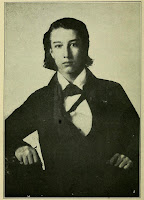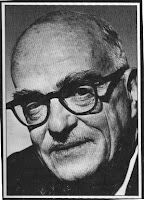Oct. 31, 1949— Marc Blitzstein's Regina, premiering at Broadway’s 46th Street Theater, represented a cross-section of American musical influences: hymns, blues, foxtrots, ragtime, polkas, and field songs, as if trying to reach a mass audience.
But the masses didn’t turn out for this adaptation of Lillian Hellman’s hit 1939 drama The Little Foxes, about the deforming
impact of greed on a woman and her siblings in turn-of-the century Alabama.
In fact, even in an era when quasi-operatic
productions were created for Broadway by such ambitious composers as Kurt Weill
(Street Scene), Gian Carlo Menotti (The Consul), Leonard
Bernstein (Candide), and Frank Loesser (The Most Happy Fella), audiences
did not warm to this material, with some attendees even demanding their money
back because they were expecting a musical.
Even with a full-page ad in The New York Times
signed by Bernstein and 11 other musical and theater luminaries that extolled
the virtues of this production, Regina lasted just seven weeks—one-twentieth of the time it took to create this piece of musical theater.
My post from earlier this year, on a 1959 Blitzstein
production, Juno, related how that show fell victim to misdirection and
miscasting. The problem with Regina was simpler: After much back- and-forth
discussion, producer Cheryl Crawford convinced the composer that this show
belonged on a musical stage rather than in an opera house.
Blitzstein, longing for the kind of recognition then
being given Rodgers and Hammerstein for South Pacific, went along with
the idea. It was a mistake.
Some opera purists didn’t appreciate the show’s use of
spoken recitative. But the principal cause of the truncated run were fans who,
expecting a traditional brassy musical comedy, encountered a brooding opera
about capitalistic excess—and demanded their money back at the show’s
intermission.
Blitzstein’s lyrics drew heavily from Hellman’s
dialogue from the original play—a convention often ignored in opera, whose
creators adapt material to their own ends.
In what’s frequently considered the loveliest song in
the show, “Birdie’s Aria,” Blitzstein affectingly depicts Regina’s sensitive
sister, who mourns the gracious aristocratic manners that once held sway at the
family estate, Lionnet, even as she drowns her sorrow in elderberry wine.
Birdie becomes a sister under the skin to another lost Southern belle crushed
by a rapacious age, Blanche DuBois of A Streetcar Named Desire (which
itself was turned into a 1995 opera by Andre Previn).

























-BelaLugosi.jpg)



